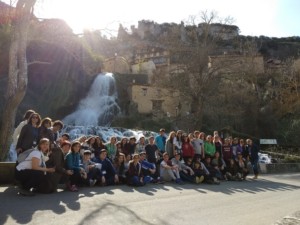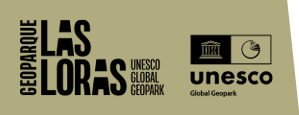The Geopark educational and scientific Project is made up of four different programmes directed to four target groups:
- Secondary school students in the region or from other regions. Work has also been done with primary school students by means of collaboration and support in other entities programmes, such as Caja de Burgos-Obra Social la Caixa Foundation “Do you know your town” and “Your town is full of life” programmes.
- Local population.
- Students and researchers at universities from inside the region or beyond.
- Visitors.
PROGRAMME 1. SCHOOL GROUPS
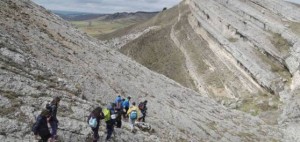
Several educational programmes have been developed by the Geopark over the years. The programmes are intended to support secondary and primary school teachers on site. One of the main aims is to give real examples, at natural sites, of many of the contents studied in the classroom.
Landscape, fossils, geological processes, knowledge about ecosystems, the link between the natural and physical environment and human beings and attitudes which favour environmental sustainability are some of the topics within our activities. The aim is to bring the learning and development of the natural heritage within Castile and León, and especially within the Geopark, closer to learners.
Due to the Covid-19 crisis the best solution for this year is that we go to the classroom, and f it is possible later on, you just have to worry about the travel and we will organise all the rest for a guided field trip.
Activities:
– Activity 1: A one to two hours educational activity at school, according to availability. The number of students shall be determined by the Covid-19 protocol at each school. Each student will be given a field notebook to be worked at school with the help of a Geopark technician.
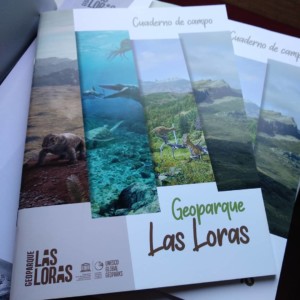
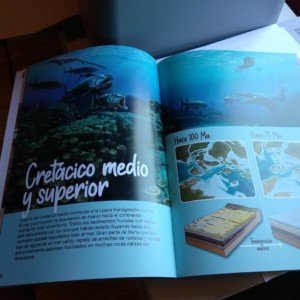
– Activity 2: Before the guided field trip teachers should revise the contents of the field notebook with their students. Support material may be provided. The teachers can opt to use the notebook throughout the school year as a working tool.
– Activity 3: Half-day guided tour within the Geopark (approximately from 10 am to 2 pm). Maximum number of 20 students divided in two groups of ten with one teacher for each group, according to Castile and Leon Regional Government recommendations for this type of activities.
2- RESEARCH AID PROGRAMME
– Gullón Grant. The biscuit company, based in Aguilar de Campoo, has an agreement with the Geopark to fund research projects in any field of science for an amount of €4,000, which any research group in the country can apply for. So far, the following projects have received grants:
2021- Damas, L. et al. Lithologies used in the churches of the Valdelucio valley (Geoaprque Las Loras). University of the Basque Country.
2022- Benito Calvo, A. et al. Las Loras: relict evidence of denudation cycles during the Cenozoic. CENIEH.
2023- García, J. Fitolitos, barro y piedra: los modos de vida en la protohistoria de las Loras a través del registro geoarqueológico. Institute of Archaeology of Mérida (IAM) CSIC-Junta de Extremadura.
– Agreement with the Entretantos Foundation. The Geopark has an agreement with this entity for the development of research projects on issues of social participation, agroecology and natural heritage.
– Diez Ferrer, B. Study and valorisation of the palaeobotanical record (macroflora and microflora) in Jurassic and Cretaceous formations in the “Las Loras” Geopark. University of Vigo. 2020.
– Serrano, E. et al. Inventory and characterisation of the Combes of Las Loras Geopark. Structural geomorphology and landscape. University of Valladolid. 2020-21.
– De la Hera, A. and López Gutiérrez, J. Study of the possible hydrothermalism associated with the Ubierna fault within the UNESCO World Geopark Las Loras: consequences in relation to the sustainability of groundwater and its future projection (IGME-CSIC). 2022.
– Torcida, F. et al. Study of the deposits of the Aguilar de Campoo reservoir (Palencia): dinosaur palaeontology, stratigraphy and dating. Archaeological and Palaeontological Collective of Salas de los Infantes, University of Zaragoza, University of Salamanca, University of Cantabria, University of the Basque Country, Dinosaur Museum of Salas de los Infantes. 2022-23
– Inventories of tuffs, peat bogs, orchids and butterflies in the Geoaprque.
– Agreements with the USAL
– Pereira, MD.
The Las Loras Geopark as an example of a community vulnerability study in case of geological risk.
– Understanding geohazards from landsides of the past.
– Geoparks as tools to communicate science: A local approach to understand the importance of geology in cultural heritage and human activities.
– Laura Tascoón. 2023. Importance of scientific dissemination of natural hazards in geoparks, proposal for Las Loras Geopark (Palencia, Spain). Ediciones Universidad de Salamanca / CC BY-NC-SAArtefaCToS, Vol. 12, No. 2, (2023), 155-183.
– Javier Elez, Yolanda Sánchez Sánchez, Mariano Yenes Ortega, Imma Palomeras Torres, Irene de Felipe Martín and Pablo G. Silva.
Geomorphological and hydrological study of the karst of Las Tuerces and Lora de la Valdivia.
– Yenes, M.
– Rockfall risk analysis using conventional survey methods and rpas photogrammetry. Application to the Horadada canyon (Las Loras Geopark, Palencia).
– TFG: Geomorphological analysis of the erosive surfaces and the karstic and hydrological evolution of the Valdivia and Las Tuerces (Las Loras Geopark, N of Spain). 2023. Jorge Contreras Castro. University of Salamanca.
PROGRAMME 3. LOCAL POPULATION
Activities: Information talks, tours, exhibitions, and participation in the Geoloday, Geological Week and Volunteer Programme.
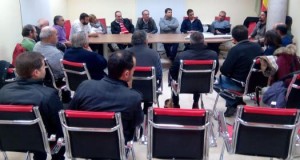
PROGRAMME 4. GROUPS OF UNIVERSITY STUDENTS AND RESEARCHERS
Activities: immersion programmes in order to understand the territory, grants for research projects, conferences, guided tours and documentation centre.
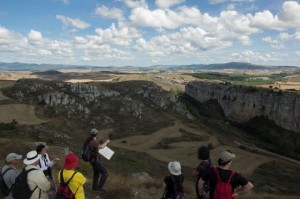
PROGRAMME 5. Tourist
Activities: Visits to Information centres, Information talks, tours, exhibitions, and participation in the Geoloday, Geological Week and Volunteer Programme.
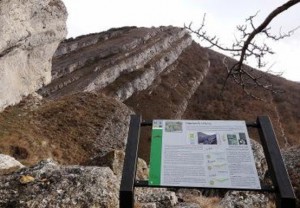
OTHER EDUCATIVE EXPERIENCES: ERASMUS, INTERCHANGES, STUDENTS IN PRACTICE, MASTERS, FINAL DEGREES…
These years we have been involved in several Erasmus plus and interchange projects at the local level, one with the Campos de Amaya Secondary Institute in Villadiego, with a student exchange program with three other European Geoparks. For more information at:
http://iescamposdeamaya.centros.educa.jcyl.es/sitio/index.cgi?wid_seccion=41
http://lyk-peir-mytil.les.sch.gr/fourgeoparks/index.php/news
Another three host and tutored project for a master’s degree student of the Master of Geological Heritage at the University of Minho in Portugal and a student of Geology at the University of Aveiro. Also a student at the University of Mexico!
At the local level in 2019 there has been an exchange of students and experiences between the Villadiego Institute and the Aguilar de Campoo Institute and they have had the opportunity to present it at the 15th European Conference on Geoparks
We also have national internship students in the Geopark, students of pedagogy, geology, geography, etc …
This 2019-2020 academic year we have started a project with the students of Professional-Administrative Training in Aguilar de Campoo. They are creating business projects linked to the Geopark! Quite a challenge!
We encourage you to follow the various activities through Facebook !!!
All the experiences are being very enriching, fun and we are all learning a lot !!!
